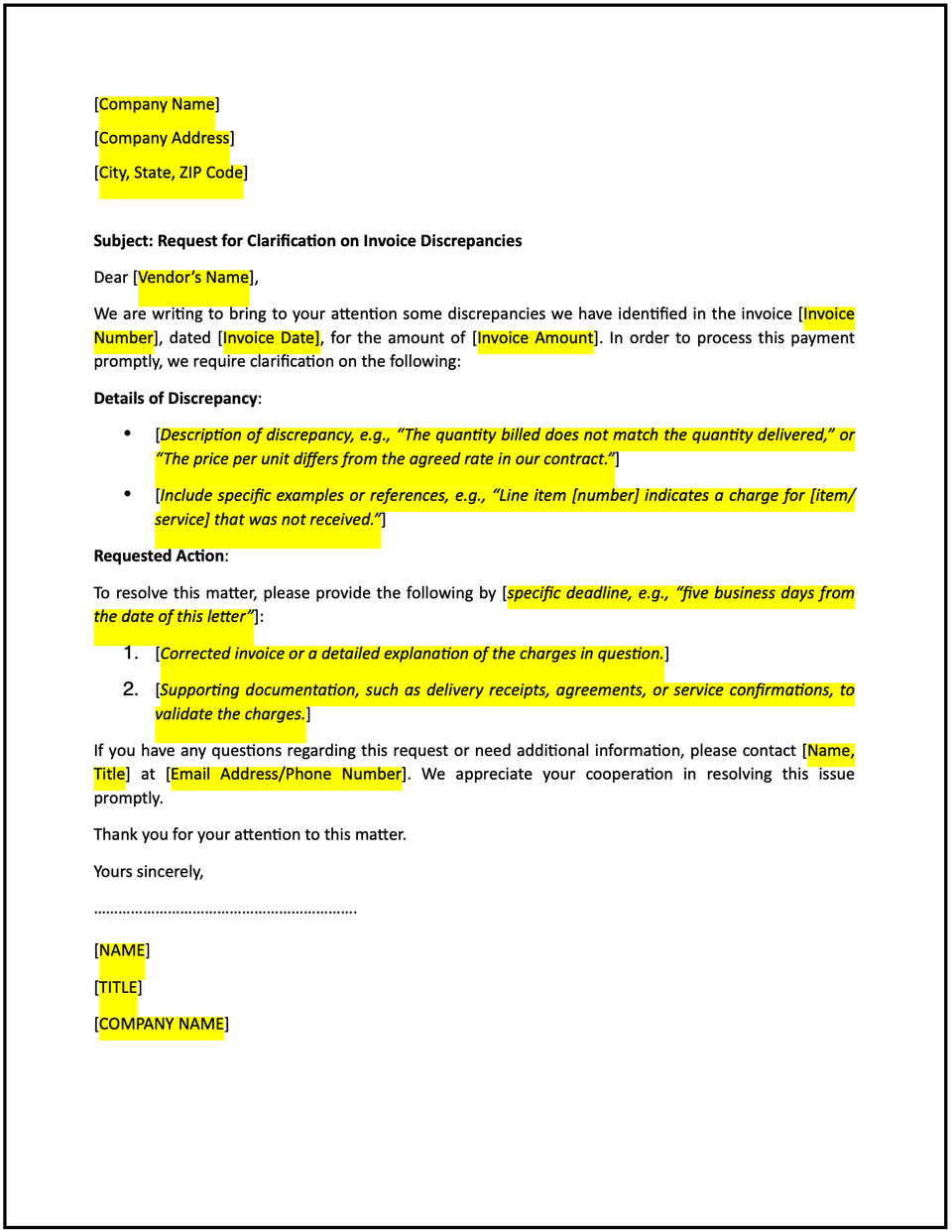Letter of request for clarification on invoice discrepancies: Free template

Letter of request for clarification on invoice discrepancies
A letter of request for clarification on invoice discrepancies is a formal communication used to address concerns regarding inconsistencies or errors on an invoice. This letter outlines the specific discrepancies, provides supporting details, and seeks clarification or resolution from the vendor in a professional and constructive manner.
How to use this letter of request for clarification on invoice discrepancies
- Open with an introduction: Address the vendor respectfully and reference the specific invoice by number, date, or other identifying details.
- State the purpose: Clearly communicate that the purpose of the letter is to seek clarification about discrepancies identified on the invoice.
- Provide details: Outline the specific discrepancies, such as incorrect amounts, missing items, or charges that do not align with the agreement.
- Reference supporting documents: Mention relevant purchase orders, contracts, or agreements that highlight the basis for your concern.
- Request clarification: Ask the vendor to review the invoice and provide an explanation or corrections for the discrepancies.
- Emphasize collaboration: Reaffirm your commitment to resolving the matter amicably and maintaining a strong working relationship.
- Maintain a professional tone: Ensure the letter is clear, respectful, and focused on achieving resolution.
- Provide contact information: Include details for the vendor to respond with clarifications or to discuss the matter further.
Benefits of using a letter of request for clarification on invoice discrepancies
This letter ensures a structured and professional way to address invoice concerns while fostering transparency and trust. Here’s how it helps:
- Promotes accuracy: Addressing discrepancies ensures invoices reflect agreed terms and conditions.
- Reflects professionalism: A well-crafted letter demonstrates respect and a commitment to resolving issues constructively.
- Encourages collaboration: Highlighting specific concerns fosters dialogue and resolution.
- Builds trust: Open communication reinforces a positive working relationship.
- Supports financial accountability: Resolving discrepancies helps maintain accurate financial records.
Tips for writing an effective letter of request for clarification on invoice discrepancies
- Be specific: Clearly describe the discrepancies, referencing relevant invoice details and supporting documents.
- Use professional language: Maintain a respectful and constructive tone to foster collaboration.
- Provide context: Briefly explain why the discrepancies are of concern and their potential impact.
- Highlight mutual benefits: Emphasize how resolving the issue supports both parties’ financial accuracy and trust.
- Include actionable steps: Share instructions for resolving the issue, such as reviewing the invoice or providing a corrected version.
- Keep it concise: Focus on the essential points while ensuring the tone is professional and engaging.
Frequently asked questions (FAQs)
Q: What details should I include in this letter?
A: Include references to the invoice, specific discrepancies, supporting documents, and your request for clarification.
Q: Should I personalize the letter?
A: Yes, addressing the vendor by name and referencing specific invoice details demonstrates attentiveness and professionalism.
Q: Who typically sends this letter?
A: Procurement teams, finance departments, or business owners typically send this letter.
Q: How formal should this letter be?
A: The tone should be professional, respectful, and focused on fostering collaboration.
Q: When should this letter be sent?
A: Send the letter promptly after identifying the discrepancies to ensure timely resolution.
Q: Can this letter include proposed resolutions?
A: Yes, suggesting resolutions such as issuing a corrected invoice can help streamline the process.
Q: Is acknowledgment from the recipient required?
A: While not mandatory, requesting acknowledgment ensures the vendor understands and is addressing the discrepancies.
This article contains general legal information and does not contain legal advice. Cobrief is not a law firm or a substitute for an attorney or law firm. The law is complex and changes often. For legal advice, please ask a lawyer.


